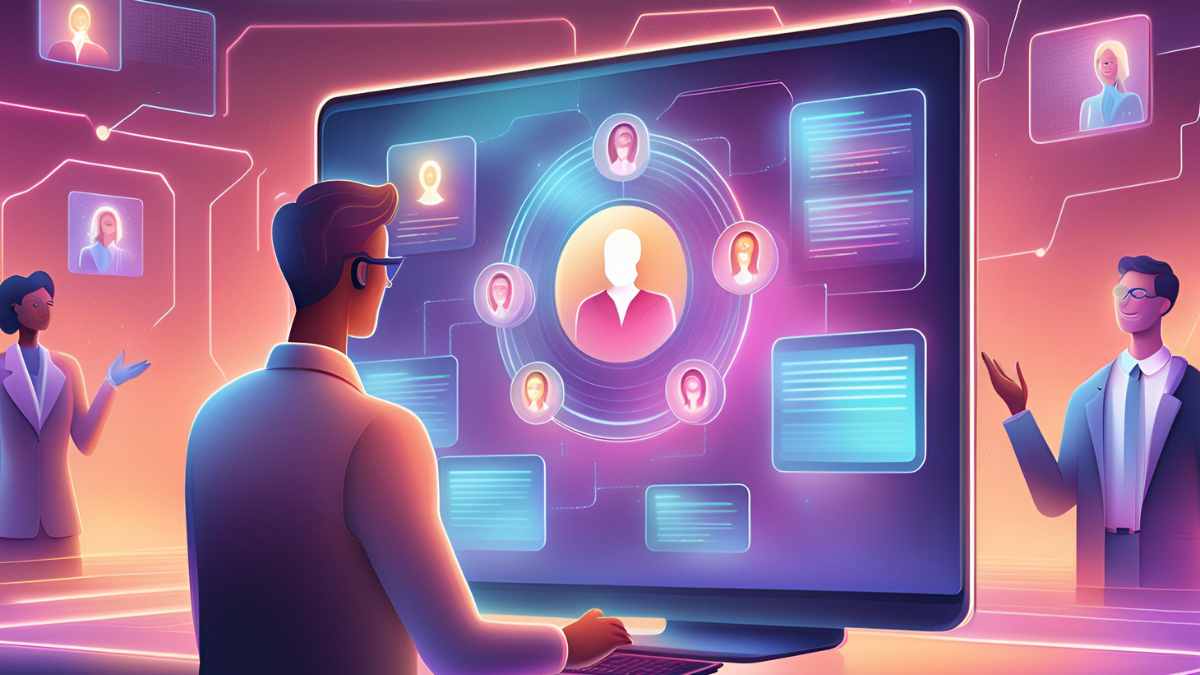Have you ever felt like your HR processes are stuck in the past? Or perhaps you’ve wondered if there’s a more efficient way to manage your workforce? The truth is, HR technology is evolving rapidly, and it’s time to embrace the future of work.
It is estimated that up to 90% of HR jobs in Singapore may be disrupted by technology, urging HR professionals to adapt to new tools and processes. This is your chance to streamline HR operations by adopting advanced solutions like HashMicro HRM, which empowers you to transform your workforce management.
By embracing HR tech, you can unlock a world of possibilities. Imagine a future where tedious tasks are automated, data-driven decisions are the norm, and your employees are happier and more productive than ever before. Let’s dive deeper into the exciting realm of HR technology and explore how it can revolutionize your business.
Key Takeaways
|
Table of Content:
Table of Content
What is HR Technology?
HR Technology, or HR tech, refers to the tools and systems that help businesses automate and streamline human resources processes. By reducing manual tasks and offering valuable insights, HR tech transforms workforce management into a seamless and strategic process. These systems empower businesses to:
- Streamline Talent Acquisition and Management: From recruitment to onboarding, these tools help attract, hire, and retain the best talent.
- Automate Payroll and Compensation: Processing salaries, bonuses, and tax compliance becomes faster and more accurate.
- Enhance Performance Management: Monitoring employee goals, feedback, and development is made effortless.
- Simplify Benefits Administration: Managing healthcare, retirement plans, and other benefits is more organized and efficient.
- Utilize Workforce Analytics: Data-driven insights support smarter decision-making for HR strategies.
- Facilitate Communication and Collaboration: Connecting teams and fostering effective communication is much easier.
Over the years, HR technology has evolved significantly. Many large organizations have moved from traditional on-premises systems to flexible cloud-based platforms like HashMicro, Oracle, SAP, and Workday. These modern systems lower costs, improve scalability, and provide real-time access.
Small and midsize businesses across Singapore are also embracing HR tech, favoring SaaS platforms for their affordability and simplicity. Companies adopting these technologies gain the ability to focus more on growth and less on administrative burdens.
Adopting HR technology drives efficiency and enhances employee engagement, making it essential for competitive businesses.
What are the Types of HR Tech?
HR technology offers a wide range of tools designed to simplify and enhance workforce management. From automating payroll to boosting employee engagement, these tools help businesses streamline operations and focus on growth. Here’s a quick look at the key types of HR tech:
- Payroll Management Systems: Simplify salary computation, tax deductions, and attendance tracking while ensuring compliance with local laws. Cloud-based options provide easy access to payslips and records, making payroll stress-free.
- Talent Management Software: Streamline recruitment, onboarding, and career planning. Tools like Applicant Tracking Systems (ATS) and succession planning software save time and ensure a steady talent pipeline.
- Performance Management Systems: Track employee performance, identify skill gaps, and enable fair rewards or promotions. These tools promote productivity and build a culture of transparency.
- Learning Management Systems (LMS): Deliver cost-effective e-learning and training programs while easing onboarding processes with instant access to resources.
- Employee Engagement Software: Boost team morale with surveys, virtual communities, and recognition programs. By valuing employee input, businesses can improve retention and workplace culture.
- Travel and Expense Management Tools: Automate expense reporting and reimbursement processes, ensuring compliance and reducing errors.
- Benefits Management Systems: Manage paid leave, retirement plans, and other benefits efficiently. Employees gain easy access to their benefits information, fostering satisfaction and trust.
- All-in-One HR Platforms: Integrate multiple HR functions like recruitment, payroll, and analytics into one system, making operations seamless and data-driven.
What are the Future Trends in HR for Your Business?
As HR continues to evolve, staying ahead of key trends will be essential for businesses in Singapore to maintain a competitive edge. Here are the top trends shaping the future of HR and how your organization can prepare for them:
-
AI-powered HR transformation
AI is revolutionizing recruitment, performance management, and employee engagement. By analyzing candidate pools and addressing biases, AI ensures a more efficient and fair hiring process. AI-powered chatbots and virtual assistants also automate administrative tasks, allowing HR to focus on strategic priorities.
-
Strategic skills development
With technology advancing rapidly, businesses must invest in upskilling programs to bridge the growing skills gap. A focus on developing future-ready skills not only prepares your workforce for challenges ahead but also boosts employee satisfaction by aligning growth with business goals.
-
Employee wellbeing focus
Work-life balance and mental health are now essential business priorities. With remote and hybrid work on the rise, HR tech that supports employee wellness, such as mental health platforms and flexible schedules, will keep teams engaged and productive, no matter if they are in Singapore or elsewhere.
-
Global and flexible workforces
The rise of remote work has made hiring talent from anywhere in the world more feasible. By using HR technology and partnering with Employer of Record services, businesses can navigate compliance and cultural differences, ensuring smooth onboarding and management of global teams.
-
Empowering blue- and new-collar workforces
With increasing demand for workers in trades and high-tech sectors, offering practical training and career development opportunities will help attract and retain top talent in these roles, contributing to overall business success.
-
Silver workforce integration
The rise of unretirement means businesses can tap into the wealth of experience older employees bring. Flexible work arrangements and tailored benefits will allow you to harness their expertise, fostering a multi-generational and inclusive workplace.
Why Do These Trends Matter for Your Business?
Adapting to HR trends is crucial for staying competitive and future-ready in Singapore’s dynamic business environment. Proactive businesses can seize opportunities, overcome challenges, and position themselves as leaders in their industries.
Embracing innovative technologies like AI streamlines processes, boosts efficiency, and shifts HR teams’ focus to strategic priorities. Automation reduces administrative burdens, while AI-driven insights enable smarter workforce management decisions.
Fostering resilience through upskilling, wellbeing initiatives, and flexible work arrangements helps employees adapt to change while maintaining productivity and satisfaction. This approach enhances organizational agility and builds trust and loyalty.
Promoting diversity and inclusion creates a more innovative and collaborative workplace. By valuing diverse perspectives, businesses can attract top talent, improve engagement, and boost retention, ultimately driving better performance.
Integrating these trends into your strategy ensures your organization not only navigates challenges but thrives in an ever-evolving marketplace. Taking action today secures a stronger, more sustainable future for your business and its people.
What are the Differences Between HRIS, HRMS, and HCM Software?
As HR technology evolves, knowing the differences between HRIS, HRMS, and HCM is key to optimizing your human resources management. While they share a common goal of supporting HR functions, these systems differ in features, scope, and strategic impact.
HRIS (human resources information system)
HRIS serves as the foundation for HR management, focusing on employee data. It simplifies tasks like payroll, benefits management, and attendance tracking, ensuring accurate data and efficient operations. However, HRIS is best suited for essential HR needs and doesn’t offer advanced features for strategic planning or employee development.
HRMS (human resource management system)
Building on HRIS, HRMS provides tools for recruitment, performance management, training, and employee engagement. This comprehensive system integrates operational and strategic HR functions, enabling businesses to monitor performance, support professional growth, and improve decision-making.
HCM (human capital management)
HCM takes HR to a strategic level, offering advanced features like workforce planning, succession management, and business analytics. Leveraging AI and machine learning, HCM aligns HR strategies with business goals, maximizing productivity, fostering talent growth, and enhancing employee retention.
Key Differences
- Features: HRIS focuses on administration, HRMS expands to talent management, and HCM offers strategic planning.
- Employee Engagement: HRIS handles data, HRMS improves engagement, while HCM emphasizes employee experience.
- Strategic Impact: HRIS and HRMS enhance efficiency; HCM positions HR as a driver of business success.
What are the Examples of HR Technology?
HR technology is transforming the HRD role by automating tasks, enhancing efficiency, and aligning HR operations with business goals. Here are key examples of HR technology every business in Singapore can leverage:
-
Payroll and compensation management
Modern payroll systems automate calculations, tax deductions, and benefits processing, ensuring compliance and reducing errors. Meanwhile, compensation tools analyze market trends and employee performance to craft competitive pay structures that attract and retain top talent.
-
Talent acquisition and recruitment
Applicant Tracking Systems (ATS) streamline hiring with tools for job posting, resume screening, and candidate tracking. Additionally, Candidate Relationship Management (CRM) platforms and employee referral software help businesses build talent pipelines and tap into trusted networks for quality hires.
-
Performance management and employee development
Continuous performance management tools facilitate real-time feedback and goal-setting, keeping employees engaged. Learning Management Systems (LMS) further support development by offering tailored training programs with interactive content and progress tracking.
-
Employee engagement and well-being
Engagement platforms create a collaborative environment with social features and gamification, boosting motivation. Wellness platforms track health metrics and encourage healthier habits, integrating with wearable devices for a holistic approach to well-being.
-
Benefits management
Self-service portals simplify benefits enrollment and management, enhancing the employee experience. Advanced systems also use analytics to customize benefits packages, ensuring relevance and cost-efficiency.
-
Workforce analytics
Analytics platforms provide actionable insights on performance, turnover, and engagement. These tools help optimize workforce planning, improve hiring strategies, and align HR efforts with business objectives.
-
Time and Attendance Tracking
Time-tracking software automates shift management and monitors work hours, ensuring labor law compliance and seamless integration with payroll.
-
Travel and Expense Management
Travel systems simplify booking, expense tracking, and reimbursements, linking with payroll for efficient and timely processing.
What Factors Should be Considered When Selecting HR Technology?
Choosing the right HR technology is an essential decision for any business looking to improve operational efficiency and support workforce management.
With numerous solutions available, evaluating the factors that will have the most significant impact on your business is crucial. Here are the key factors that businesses in Singapore should consider when selecting HR technology.
1. Understand your organization’s needs and goals
Start by identifying your business’s HR challenges. Whether you’re focused on recruitment, payroll, or employee performance, selecting technology that directly addresses these needs will streamline your operations and avoid unnecessary features.
2. Focus on scalability and flexibility
As your business grows, so will your HR needs. Choose a solution that can scale with your company, allowing for easy adaptation to new employees, locations, or HR functions. This ensures long-term support for your organization.
3. Ensure data security and compliance
Data protection is non-negotiable. Ensure the HR technology complies with Singapore’s Personal Data Protection Act (PDPA) and offers robust encryption, strong access controls, and regular security updates to protect sensitive employee data.
4. Integration with existing systems
Your HR platform should integrate seamlessly with existing systems like payroll and accounting. This integration minimizes errors, reduces duplication, and offers a unified view of your workforce, enhancing efficiency across departments.
5. User experience and training
An intuitive, easy-to-use platform is key to quick adoption and maximum effectiveness. Choose HR technology training with a user-friendly interface and comprehensive training materials for HR staff and employees, ensuring smooth onboarding and use.
6. Evaluate customer support and vendor responsiveness
Reliable support is essential during implementation and beyond. Look for vendors that offer multiple support channels and respond quickly to inquiries, ensuring minimal disruption to your operations.
7. Consider budget and total cost of ownership
Consider the total cost of ownership, which includes the initial cost, maintenance, training, and potential upgrade fees. Choosing a high-quality solution that fits your budget can save money in the long run by improving efficiency and reducing errors.
8. Look for AI and advanced features
HR technology is increasingly leveraging AI and predictive analytics to enhance decision-making. Look for solutions that use AI for recruitment, performance tracking, and learning paths, as these features can drive better outcomes in talent management and employee retention.
9. Review vendor roadmap and long-term viability
Technology evolves rapidly, so select a vendor committed to ongoing innovation. Review their roadmap to ensure they will continue to update and improve the platform, keeping your business ahead of the curve.
10. Prioritize employee engagement and adoption
The success of HR technology depends on employee engagement. Choose platforms that empower employees through self-service options, mobile access, and interactive features, making the system a valuable tool for both individuals and the organization.
It’s almost done, but before we dive into the conclusion, let’s take a moment to highlight how selecting the right HR technology among the best HR software, can significantly enhance your business operations.
Conclusion
Investing in a comprehensive HR software solution can significantly streamline your HR processes. From accurate payroll management, where salaries are calculated based on working hours, overtime, and attendance, to employee database management with secure and centralized storage, HR software helps businesses stay organized and compliant with Human Resource Compliance regulations.
Features like expense management allow for easy tracking of allowances, reimbursements, and cash advances, while attendance management integrates seamlessly with timekeeping systems for automated analysis.
Employee contract management ensures real-time tracking and alerts when contracts near expiration, and leave management simplifies requests and automatic balance updates. These features not only improve efficiency but also enhance overall employee experience, allowing businesses in Singapore to focus on growth and productivity.
If you’re looking for an all-in-one HR solution, consider HashMicro’s HRMS which is designed to meet the demands of modern businesses with simplicity and accuracy. Take the first step toward transforming your HR operations today with a free demo!




































